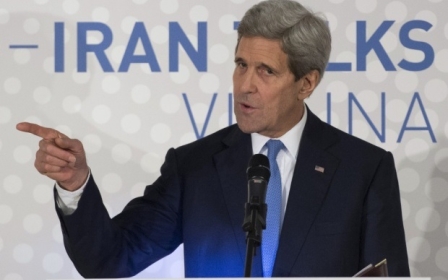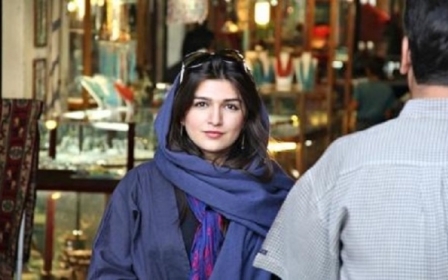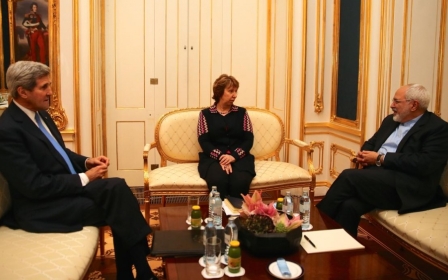Elusive nuclear deal undermines Rouhani government

As widely expected, Iran and the-so-called P5+1 failed to reach an agreement in Vienna. Whilst both sides attempted to put a brave face on the extension, and will doubtless talk optimistically about the next round of talks scheduled for December, realistically the prospects for reaching a comprehensive agreement by next June are not high.
In fact, the longer the talks drag on, the higher the chances are that the settlement will fail. Extended negotiations create space for hardliners and sceptics on both sides and increase the tolerance threshold for a half-agreement or even a frozen “crisis” that may drag on for another decade.
The biggest loser in this scenario is the centrist government of President Hassan Rouhani, whose central mission is the resolution of the nuclear issue and the consequent removal of the robust sanctions regime.
Failure to secure a deal demoralises Rouhani’s core constituency, turns off voters and in turn emboldens the president’s detractors and enemies within the establishment, namely the hardliners who are striving to reclaim the upper hand.
Unbridgeable divide?
Before discussing the political angles of the issue, it is worth noting the massive technical, scientific and strategic factors at stake at the nuclear-related negotiations.
The current disagreement, which at times has threated to develop into a full-blown crisis, is often traced to August 2002 when the uranium enrichment facility in Natanz and the heavy water reactor in Arak were first spotted.
In reality it goes back more than a decade, to the early 1990s when western and Israeli governments’ concerns over Iran’s alleged ambitions were routinely aired by western broadcasters and the press. The definitive origin is a report by a West German magazine that revealed as early as 1984 that Iran many only be a “few years” away from producing a nuclear bomb.
Thirty years have passed and Iran is yet to possess nuclear weapons. Moreover, notwithstanding Iran’s difficult dialogue with the International Atomic Energy Institute, there is no reliable evidence to suggest that the Islamic Republic is intent on producing nuclear weapons.
On the other hand, there is no denying the fact that Iran has made significant strides over the past two decades on capacity-building and acquiring in-depth expertise on all aspects of nuclear power and technology.
More to the point, in view of the depth and breadth of Iran’s nuclear programme, it seems entirely likely that in the event of a clear-cut decision to pursue nuclear weapons capability, the country would be able to achieve that in a relatively short period of time.
This goes to the heart of the nuclear dispute. Western fears about Iran’s putative intentions only increase as capacity-building and the internalisation of a wide range of skills and expertise deepen.
To Iran’s political establishment - and a clear majority of the Iranian public - western demands for a cap on capacity-building and the reversal of hard-won achievements are extremely unpalatable. This is made worse when viewed in tandem to the sacrifices the Iranians must incur to obtain those achievements.
In recent days in Tehran and other major cities, hardliners and sceptics opposed to making major concessions have erected murals and tributes to Iranian nuclear scientists assassinated by hostile intelligence services. The message is clear: huge sacrifices have been made to achieve notable scientific and technical progress, and politicians negotiate about these achievements at their peril.
Rouhani, and the international relations experts and security and intelligence teams guiding his foreign policy, are as sensitive as other political factions to the sacrifices and gains of the past two decades.
Where they differ with the hardliners- and the bulk of the establishment (which is largely comprised of sceptics) - is on the necessity of resolving the nuclear-related dispute.
President Rouhani and his teams argue that without a comprehensive deal and the lifting of sanctions, Iran’s economy risks irreparable damage. If this happens, they would argue, it would undermining political stability and the economic prospects of future generations and the Iranian state.
However. the hardliners - and to a lesser extent the sceptics - are not convinced by the economics argument. They argue that the Islamic Republic has for years successfully evaded, defeated or undermined a raft of sanctions and that Iran’s economy has become structurally stronger on account of self-sufficiency and distance from global financial markets.
The establishment’s promotion of a ‘resistance economy’ (Eqtesad-e-Moqavemati) is a direct rebuke to Rouhani’s plans for the removal of the sanctions regime and subsequent foreign investment in key sectors of the economy. More to the point, the ‘resistance economy’ does not bode well for the negotiations due to be completed by end of June 2015.
Undermining Rouhani
Rouhani may not be a liberal reformer in the mould of former president Mohammad Khatami, but he has a clear vision for normalising Iran’s relations with the West. Most importantly of all his foreign policy team, led by foreign minister and chief nuclear negotiator Mohammad Javad Zarif, is intent on placing Iran’s relations with the United States on a stable footing.
Securing a comprehensive nuclear deal is viewed as essential to reaching a wider settlement, or at a minimum a tacit strategic understanding with arch foe the United States. This is another reason why Rouhani’s negotiations strategy with the P5+1 has rattled powerful elements in the Iranian establishment.
Hitherto Rouhani’s firm and longstanding footing within the system and his relative proximity to the supreme leader, Ayatollah Khamenei, has saved him and his government from the full wrath of a vigilant establishment.
It is worth noting that the same establishment, in tandem with the hardliners, waged an eight-year war of attrition on former President Khatami, in effect destroying the prospects for wide-ranging political and socio-cultural reforms.
There are signs that a similar campaign - albeit one carried out with less intensity - may now be mounted against Rouhani and his allies.
On Sunday, a day before the nuclear deadline was extended, 15 parliamentarians asked that the intelligence minister, Mahmoud Alavi clarify his position on reports that the intelligence agency of the Islamic Revolutionary Guards Corps (which often works in parallel with the intelligence ministry), had begun waging an operation of psychological warfare and political sabotage against the government.
If true, these reports bode very badly for Rouhani’s tenure as president. At the very least, this would be yet another sign that powerful elements within the establishment have started mobilising resources to constrain the president’s ability to make significant concessions on the nuclear issue – boding badly for the future of the talks.
- Mahan Abedin is an analyst of Iranian politics. He is the director of the research group Dysart Consulting.
The views expressed in this article belong to the author and do not necessarily reflect the editorial policy of Middle East Eye.
Photo: President Hassan Rouhani speaking at the UN General Assembly in New York (AFP)
New MEE newsletter: Jerusalem Dispatch
Sign up to get the latest insights and analysis on Israel-Palestine, alongside Turkey Unpacked and other MEE newsletters
Middle East Eye delivers independent and unrivalled coverage and analysis of the Middle East, North Africa and beyond. To learn more about republishing this content and the associated fees, please fill out this form. More about MEE can be found here.





